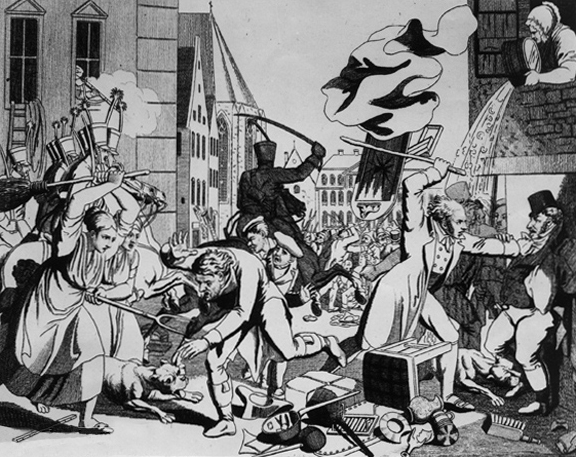As a child, I used to have nightmares of the SS (Hitler’s police force) knocking on my door. Today, this childhood nightmare is a terrifying reality for thousands of Palestinian children. How did this happen?
To answer this question, we may first ask another: Why do so many Jewish people support the State of Israel? Is it religion? Genetics? History? International Law? All of these may be justifications, but are they the driver?
Many people believe that Biblical references to a “Chosen People” and a “Promised Land” are the drivers. While this may be true for the new breed of Messianic Settler extremists, it certainly was not for most Jewish people I grew up around.
The only time I can remember hearing the term “Chosen People” was in the ironic line, “Chosen for what?” The operant myth was not one of divinely ordained superiority, but of historical persecution and ever-present threat. This is reflected in countless Jewish narratives we see on Israel-Palestine today. Just last month, two self-described “lifelong Zionists” wrote in the Washington Post:
Our support for Israel has been founded on two convictions: first, that a state was necessary to protect our people from future disaster; and second, that any Jewish state would be democratic, embracing the values of universal human rights that many took as a lesson of the Holocaust. Undemocratic measures undertaken in pursuit of Israel’s survival, such as the occupation of the West Bank and Gaza and the denial of basic rights to Palestinians living there, were understood to be temporary.
This amalgam of the “lesson[s] of the Holocaust,” the threat of “future disaster” for the Jewish people, and the acceptability of “undemocratic measures” (as long as they’re “temporary”) is by no means an isolated case. Weeks earlier, Israeli President Benyamin Netanyahu told the UN General Assembly:
“70 years after the murder of 6 million Jews, Iran’s rulers promised to destroy my country, murder my people, and the response from this body, the response from nearly every one of the governments represented here has been absolutely nothing—utter silence, deafening silence.… Yet last year this assembly adopted 20 resolutions against Israel, and just one resolution about the savage slaughter in Syria.… To borrow a line from Yogi Berra, when it comes to the annual bashing of Israel at the UN, it is déjà vu all over again.”
One could multiply these examples indefinitely. Israel, the story goes, is a necessary response to the Holocaust. Israel exists in the omnipresent shadow of a looming future Holocaust; a fragile Jewish lifeboat adrift in a sea of hateful Arabs (a “tough neighborhood” in Tom Friedman’s code) doing what it must to protect both itself and Jewish people from everyone else.
To return to my childhood nightmare, as a fourth generation American with no immediate family involved in pogroms or the Holocaust, I had no direct connection to any persecution of Jews other than the knowledge that my father’s ancestral town of Sveksna, Lithuania was now a mass grave. In other words, the trauma I expressed in those nightmares was not my own, but the product of stories and images of people I did not personally know. While I moved on to a larger world in which Jewish people played a relatively small role, those who spent their lives in primarily Jewish social environments were subjected to a continuous cultural reinforcement of this fear—a reproduction and amplification of the original trauma that is the polar opposite of a healing process. As my Nazi nightmares faded along with other childhood monsters, theirs congealed into a worldview.
So it is that millions of people who have no direct personal connection to the Holocaust feel a visceral connection to it and to Israel, one that works on a fight-or-flight level of personal survival. This can be easily seen in the inability of so many to empathize with or even contemplate the plight of the Palestinian people. “It’s complicated,” they will say. Indeed, cognitive dissonance is complicated.
When you peel back the layers of twisted truths, half-truths and outright lies that are used to justify the relentless colonization and expansion of the State of Israel (“a land without a people,” “they attacked first,” “they expelled us from their countries,” “they have 22 countries and they won’t let us have one”), you ultimately arrive at something like the position of Ari Shavit:
If need be, I’ll stand by the damned. Because I know that if it wasn’t for them, the State of Israel would not have been born. If it wasn’t for them, I would not have been born. They did the dirty, filthy work that enables my people, myself, my daughter and my sons to live (1993:131).
While acknowledging that the violence of 1948 was neither accident, nor spontaneous defense, but a broader and consciously planned act, Shavit—like many “Liberal Zionists”—accepts the need to create a Jewish State by any means necessary. This is confirmed in the writings of pre-1948 Zionists, such as Israel Zangwill’s affirmation that:
If the Zionists thus naively imagined that you could make omelettes [sic.] without breaking eggs, the eggs that have already been broken in Palestine are proof that History has not yet changed her laws. There is no way for a people, once pushed out of its country, to push in again unless at the point of the sword…. The only chance of reconstructing a nationality without the sword is to colonize…an unpopulated territory.… But if Palestine is put forward as the only possible place, then there is no resource but in Realpolitik; in accommodation to the cockpit (1921:95).
So it is that, a mere three years after the liberation of the Nazi camps, armed Jewish militias were ordering entire villages into their squares, separating men from women, forcing the men to strip, and sending them to refugee camps, forced labor camps and mass graves. As former Haganah (and former Israeli) Joseph Ben Auzer says in the forthcoming documentary, Road to Tantura:
I’m a Holocaust survivor, and when I was about 10 years old, I experienced a similar situation to what Tantura experienced…. In Tantura, I was there when they were all driven out from their homes, and it reminded me so much of what I experienced as a child. And I couldn’t live with this, it really haunted me. And I decided [to] leave the country. I didn’t want to be taking part in that.
The truth is that Israel’s actions have never been about security—at least not in the narrow sense of security from the local population and neighboring states. If they had been, Israel would never have been created; European Jews would have simply continued living as a minority in a multi-ethnic post-Colonial Palestine. The security that Israel has always been about is an existential security, a somatic conviction that if Jews do not control their own state, they will unfailingly face a new genocide. Thus it is that the Nakba left the new State with a manageable 20 percent “Israel Arab” population, in what is probably the largest and cruelest case of gerrymandering in history (a policy that continues to this day in an endless stream of expulsions, home demolitions, residency revocations, etc.).
Israel is the lifeboat, the insurance policy, the refuge that alone can ensure that when the inevitable next Holocaust arrives, Jews will have a place to go. And it is this deep linking of Israel to collective existential fear that justifies for so many Jewish Zionists the profound ethical contradiction that is Israel: that in order to protect themselves from racist persecution, ethnic cleansing and genocide, a people has the right to commit precisely those same crimes against another people.
If we are to address the true problem of the “Mid-East Conflict,” i.e., recognition of the legitimate grievances of the Palestinian people and the wrongs done them, the irrational fear that fuels the ongoing denial of this basic truth must be named, exposed, and exorcised. Those who visit Holocaust museums and read Holocaust literature yet turn away from virtually identical crimes when the victims and perpetrators happen to be the “wrong” ones, are missing the true lesson of the Israel experiment: that victims can become so steeped in their own victimhood, so convinced that whatever they do is justified, that they can literally become their abuser.
My rights end where my neighbor’s begin. The choice cannot between my genocide and their genocide, but only between a world with genocide and a world without. Ultimately anyone who feels a personal connection to the victims of the Holocaust has a simple choice: to take “never again” to mean either “never again for anyone,” or “next time, the Nazis will be us.”
Relephant Favorite:
How I Became Pro-Palestine & Why It Matters.
~
Author: Peter Cohen
Editor: Travis May
Photo: Wikipedia












Read 4 comments and reply